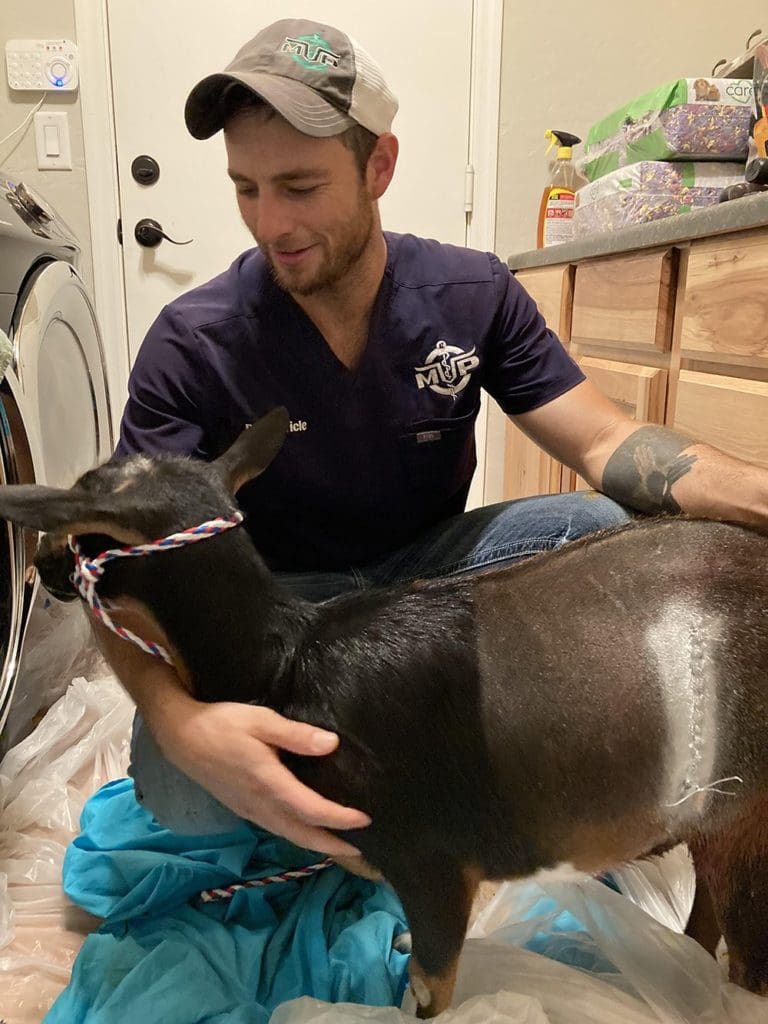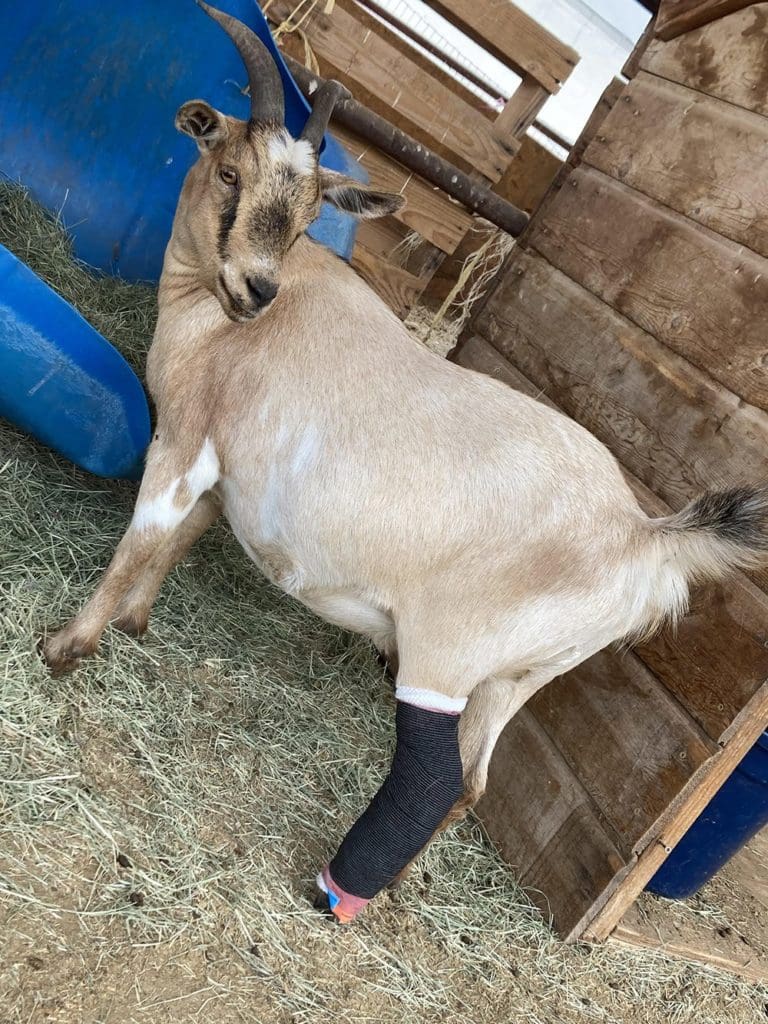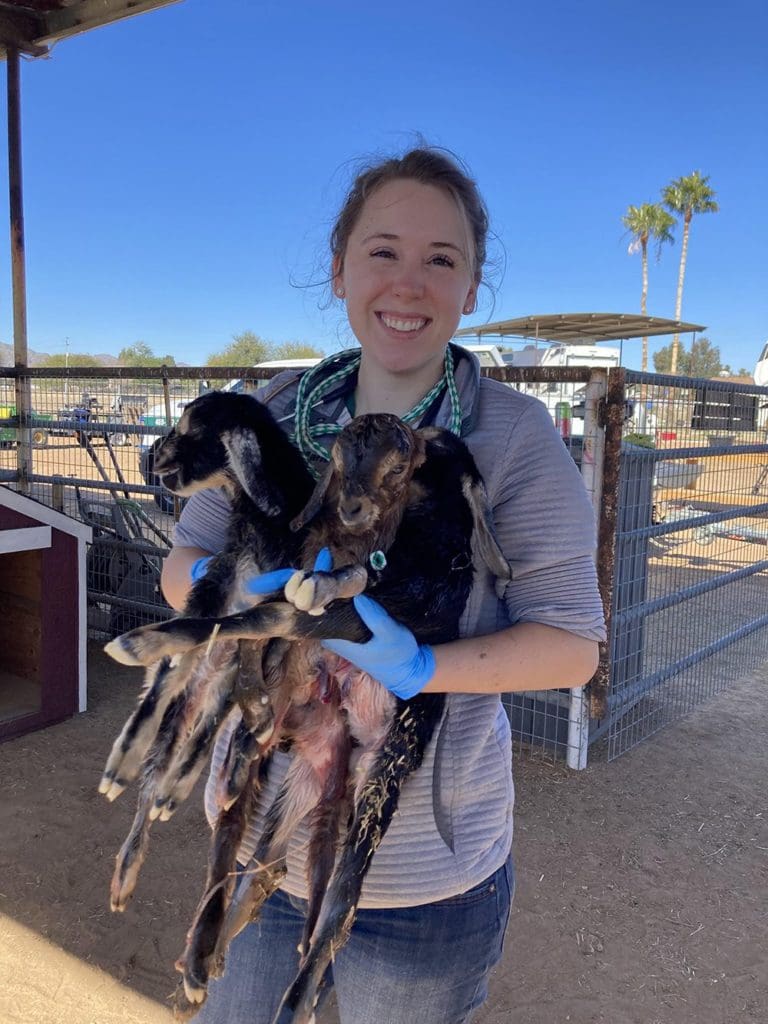Goats
Surgical Goat Procedures
"Our doctors provide a complete physical exam and consultation for your animal. A typical wellness visit allows plenty of time to discuss nutrition, husbandry, and answer any additional questions specific to your animal’s needs.
It is recommended that sheep and goat feet be trimmed every 6 months. Our team have the tools necessary that will make any hoof trim experience smooth for the animal and the owner.
Every animal’s immunization needs are different. We will tailor vaccinations to your animal’s needs based on age, history and environment."
We take pain management very seriously and our buck and ram castrations are practiced with gold standard medicine. We have the options to either haul in our mobile surgery trailer or perform the castration in the field. Your animal will receive a physical exam and light sedation before being placed into an adequate surgical plane of anesthesia, either via gas or injectable anesthesia for their procedure. Once under, the surgical site will be locally blocked and we also provide the necessary tetanus vaccine and antibiotics. Pain medications will be given during the appointment and will be sent home as well in order to keep your small ruminant comfortable while he heals.
Health Certificates (also known as CVIs - Certificate of Veterinary Inspection) are required for any animal that is going to travel or sold across state lines or internationally. Our doctors will perform a complete physical exam to ensure your animal is healthy and fit to travel. Additionally they will make sure your animal has all the necessary testing and paperwork required to travel and forward you the documents once completed for your records.
Laparoscopic artificial insemination is performed by a Dr. Chris Burrows, trained by New Frontier Genetics. AI includes synchronization protocol and consultation as well as sedation and pain management.
Semen acquisition is the responsibility of the client.
Semen acquisition is the responsibility of the client.
Hernias are not uncommon in our sheep and goats and we offer this surgery in the field. We will give an injectable pain medication beforehand to provide pain management during and shortly following surgery. The animal is then sedated, the area around the hernia is locally blocked, and the hernia is surgically corrected. We provide a tetanus vaccine as well as post-op antibiotics and pain medications to keep your small ruminant safe and comfortable.
Entropion surgery is used to correct a very painful condition where the eyelids turn in on themselves and cause irritation to the eyes. It is commonly seen in goats or sheep that are overweight as their fat rolls on the face will begin causing entropion over time. Using our mobile surgery trailer, we will perform a physical exam and lightly sedate your animal before placing them under gas anesthesia for this surgery. Once under, our doctors will be able to assess the eye and how best to surgically correct them. The surgical area will be locally blocked to help provide additional pain management. Your animal will receive the necessary tetanus vaccine, antibiotics, and pain medications to keep them comfortable during and after surgery. Follow up appointments may be scheduled to monitor healing progress.
During the first week of life is the best time to disbud your goat kid or calf. We provide pain management for each animal. The animal is sedated and the area is blocked with a local anesthetic. We shave and prep the area. A disbudding iron and scalpel is used to surgically remove the horn bud. The area is sprayed with aluminum bandage and the anesthesia is reversed.
Dr. Burrows will evaluate your animal for any restrictions. A combination of exercises, acupuncture, laser as well as percussion massage can be utilized to help your animal be the best they can be!
Is your herd or flock struggling with kidding/lambing rates or would you like to be prepared for the next breeding season? Ask our doctors about fertility testing for your animals. They can provide breeding soundness exams of the males of your herd which analyze the whole animal, his overall health, libido, external and internal reproductive organs, and semen evaluation. Our team is experienced with common fertility problems in small ruminants and can also offer diagnostic sampling and testing. Let us help you create a breeding health program to help your herd reach it's best potential!
After the first week of life, the horn bed has attached and erupted from the skull. We surgically remove them. We place the animal under the appropriate level of anesthesia for the procedure based on the facilities and the extent of the surgery. We locally block the area. We remove the horn in a way that extra skin is maintained to close over the open sinus and suture the opening closed. We aluminum bandage over the area and fly spray around the incision. We provide pain management and any additional medications.
A C-section is required when your doe or ewe is not able to deliver her babies naturally and is usually done in an emergency situation. Because of this, we take C-sections very seriously and provide multimodal pain management during and after the procedure to keep your animal calm and comfortable. The dam will be sedated for the procedure and once she is in an adequate plane of anesthesia, the surgical site will be locally blocked. The necessary tetanus vaccine, antibiotics, fluids, and pain medications will be administered to ensure a smooth recovery for mom and her babies.
As they are a prey species, lacerations from dog or predator attacks are the #1 emergency we see in our small ruminant patients. Or sometimes accidents happen and you come home from work to find your sheep or goat cut themselves. In either situation, our doctors are here for you and your animal. Once we arrive to your property, we will sedate your animal first in order to better assess the wound(s). Depending on the severity and age of the wound, our doctors will either close it with primary or second intention methods. We will provide a necessary tetanus vaccine, pain medications, and antibiotics if indicated to keep your animal protected and comfortable.
A rumenotomy is a surgical procedure done to explore and surgically correct problems with the rumen (a part of the goat/sheep's GI tract, their main "stomach"). It is indicated for certain types of bloat and can be performed in emergency. As with all of our surgeries, we take pain management very seriously and will perform a complete physical exam before giving sedation to your animal. Once adequately sedated, the surgical site will be locally blocked and your animal will receive the necessary tetanus vaccine, antibiotics, fluids, and pain medications to keep them safe and comfortable post-op.



